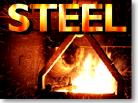|
Steel industry faces meltdown
|
 |
November 4, 1998: 6:15 p.m. ET
Steel makers shut down plants, one enters bankruptcy as 'illegal dumping' grows
|
NEW YORK (CNNfn) - An oversupply of steel in the United States, brought on by record imports from emerging-market countries, is beginning to tip the scales.
Facing new levels of competition and further erosion of their bottom lines, 12 of the nation's largest steel companies and the union that represents them are calling on Capitol Hill for regulatory relief from what they call "illegal and predatory trade" of steel imports.
In recent weeks, the market's upset balance of supply and demand has forced several steel makers to shut down plants.
Nearly all have scaled back operations and one, Acme Metal, blamed the burgeoning industry crisis for its trip down bankruptcy lane.
"The situation is only getting worse," said John Armstrong, a spokesman for the U.S. Steel Group, the nation's largest steel maker, which announced Wednesday major cutbacks at its Philadelphia plant.

"We started to notice it in July when imports really started to increase," he said. "We've virtually sold nothing abroad this year. There's no market for (steel) in Russia and Asia right now. In order for anything to be done about it, President Clinton will have to take some action to stop the dumping" of low-priced import steel.
"Supply side management"
The U.S. steel industry blames Russia, Japan and Brazil for its troubles.
Steel imports for the first seven months of the year have grown 130 percent from Japan, 93 from Korea, and 19 percent from Russia, compared to year-ago levels, according to collected data.
Most of those shipments are sold far below market value at prices that violate established U.S. trade laws, and in some cases at prices below the cost of production in their native countries, the coalition of steel makers argue, making it impossible for them to compete.
Prices of Russian steel, for example, have plummeted from about $294 per ton in late 1997 to about $250 per ton in July, U.S. Steel Group executives said. The company expects to lose a million tons of production this year alone.
"The import surge can be specifically linked to the Asian and Russian economic crises," Keith Busse, chairman and chief executive of Steel Dynamics Inc. said in testimony earlier this fall before the Congressional Steel Caucus.
"Currency devaluations are driving this unprecedented crisis, which our trade laws are not prepared to handle," he said. "Collapsing non-market economies, trying to export their way out of economic crises, are threatening our nation's basic industries."
Japan's failed financial programs, he said, are another contributing factor.
Making matters worse, many countries have closed their markets to steel imports and others have imposed import quotas -- turning the U.S. into a veritable dumping ground.
In response, a group of 12 domestic steel companies -- including Bethlehem Steel, U.S. Steel Group and LTV Steel Corp. -- have filed charges against Japan, Russia and Brazil for dumping millions of tons of unfairly traded steel into the domestic markets.
Importing change
Already, the crisis has claimed one victim.
Acme Metals Inc. of Riverdale, Ill., the parent of Acme Steel Co. and four other companies, announced in late September it filed for Chapter 11 bankruptcy protection in Delaware.
Company President and Chief Executive Stephen D. Bennett said several factors contributed to the decision to file. Chief among them was larger than expected losses due to the "rapid deterioration in steel demand and selling prices," he said.
The U.S. Steel Group of USX Corp. also said Wednesday it will suspend about 70 percent of operations at its Fairless Works plant near Philadelphia.
"The actions we're being forced to take at the Fairless plant are a direct result of the record tonnages of illegally dumped foreign steel reaching this country," said Paul J. Wilhelm, president of U.S. Steel Group. "These imports have created a huge surplus of steel in the market and a sharp decline in the order book for products from Fairless Works."
The plant employs about 850 workers. The Fairless plant normally processes between 70,000-80,000 tons per month, but with the cutbacks, its processing levels could dip as low as 15,000-20,000 tons a month.
So far this year, production levels are down around 15 percent.
And last week, LTV Corp. (LTV) also said it would idle for one week its steelmaking and rolling facility in Cleveland and extend a scheduled repair outage of a Cleveland blast furnace, due to a drop of new orders for steel.
The company said its rate of incoming orders had been reduced by record-high levels of unfairly traded imported steel.
Not all companies have felt the impact as deeply.

"It has had an impact on us, but we haven't had any layoffs," said Bethlehem Steel (BS) spokeswoman Bette Kovach. "We have reduced our volumes, prices have fallen and we are pursuing a variety of (trade) actions at the highest levels of the administration."
Those following the industry warn that if trade restrictions aren't imposed soon, however, no U.S. steel maker will be able to withstand the onslaught of competition.
"This is not trade based on comparative advantage," Busse said. "We are confronted with an economic crisis in the U.S. steel industry, stemming directly from the structural mismanagement by several governments of their economies. Neither the U.S. government, nor its steel industry, can afford to wait for the trade law process to take its course."
--by staff writer Shelly K. Schwartz
|
|
|
|
|
 |

|

